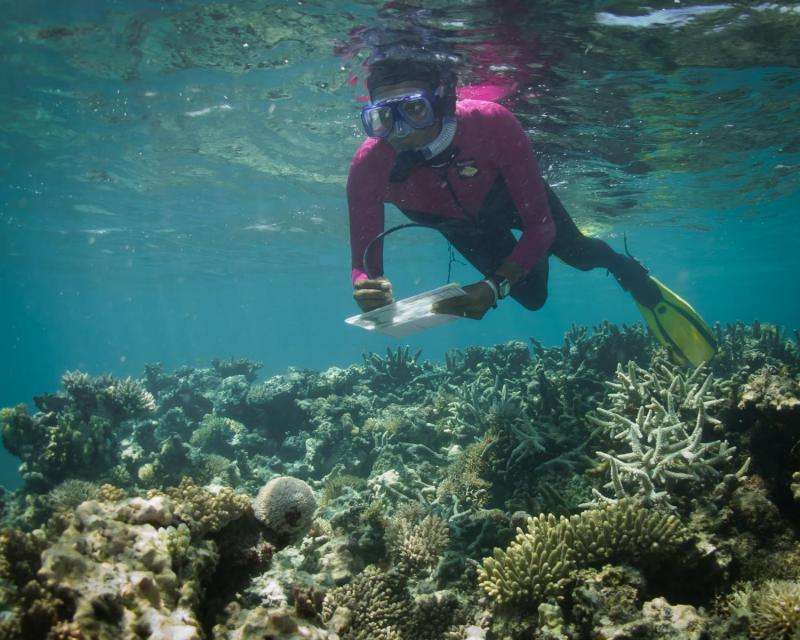New climate stress index model challenges doomsday forecasts for world's coral reefs

Recent forecasts on the impacts of climate change on the world's coral reefs—especially ones generated from oceanic surface temperature data gathered by satellites—paint a grim picture for the future of the "rainforests of the sea."
A newer and more complex model incorporating data from both environmental factors and field observations of coral responses to stress provides a better forecasting tool than the more widely used models and a more positive future for coral reefs, according to a new study by the Wildlife Conservation Society and other groups.
The study authors point out that, according to the climate stress index model first developed in 2008, coral reefs are responding to more factors than temperature and therefore more resilient to rising temperatures. They conclude that global climate change is the greatest global threat to coral reefs but the future of these ecosystems is more varied than predictions from the more widely used "temperature threshold" models.
The paper titled "Regional coral responses to climate disturbances and warming is predicted by multivariate stress model and not temperature threshold metrics" appears in the online edition of Climatic Change. The authors are: Timothy R. McClanahan of the Wildlife Conservation Society; Joseph Maina of the Wildlife Conservation Society and the Australia Research Council Centre of Excellence for Environmental Decisions; and Mebrahtu Ateweberhan of the Wildlife Conservation Society and the University of Warwick.
"Our new multivariate stress model suggests that the future of coral reefs is considerably more nuanced and spatially complex than predictions arising from the threshold models," said Dr. Tim McClanahan, WCS's Senior Conservation scientist and a co-author on the study. "According to our findings in the Western Indian Ocean, some places will do well and others will not. The key to accurate predictions is using all available environmental data and complementing it with on-the-ground observations on reef cover, coral communities, and other environmental variables that are key to understanding how corals respond to the interaction between all these variables."
In the study, the authors compared the abilities of three common thermal threshold indices against a stress model that includes temperature but also light and water quality and movement variables and used the models to predict coral cover and susceptibility to bleaching during a past large stress event: specifically the 1997-98 coral bleaching event in the Western Indian Ocean. The field information used in the test included a compilation of 10 years of coral community data before the bleaching event, two years after the bleaching event, and data during the period of coral recovery between 2001-2005.
While the three temperature threshold models (sea surface temperature, cumulative thermal stress, and annual thermal stress) were highly variable with little agreement to field data after the 1998 rise in temperature and coral mortality, the multivariate model based on 11environmental variables combined using a fuzzy logic systems revealed a more accurate fit with the recorded coral cover and susceptibility in the recovery period that followed.
"This latest research suggests a more optimistic future for the world's coral reefs," said Dr. Caleb McClennen, Executive Director of WCS's Marine Program. "The ability of certain coral communities to resist and recover from climatic factors provides hope for the future of the oceans. Our imperative is now to seek out and protect those locations that are refuges from climate change, and reduce other human stresses such as fisheries to ensure the long term survival of coral reefs."
Journal information: Climatic Change
Provided by Wildlife Conservation Society


















